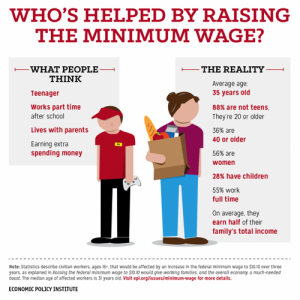3.3 million workers are paid at or below the federal minimum wage (U.S. Bureau of Labor Statistics, 2013). From 2007 to 2009 we saw yearly increases in the federal minimum wage, but it has not seen an increase in 6 years (U.S. Bureau of Labor Statistics, 2013). In those 6 years the minimum wage has become farther and farther away from a livable wage. This issue is affecting a huge chunk of our population and making it impossible for them to get out of poverty. As of 2014 a minimum wage worker made 14,500 yearly making it nearly impossible for them to support themselves let alone a family (raise the wage, 2014).
The Facts on Minimum Wage
Many people who oppose the increase in minimum wage say that it was never meant to be a wage people live off of. Those same opponents say that jobs with minimum wage are for high school students looking for a part time job and not for people trying to support a family. According to the United States Department of Labor 89% of the people who would benefit from an increase of the minimum wage are 20 and over and 56% of those workers are also women (United States Department of Labor, 2015).
meant to be a wage people live off of. Those same opponents say that jobs with minimum wage are for high school students looking for a part time job and not for people trying to support a family. According to the United States Department of Labor 89% of the people who would benefit from an increase of the minimum wage are 20 and over and 56% of those workers are also women (United States Department of Labor, 2015).
What is Currently Being Done?
In 2013 President Obama called on Congress to raise the minimum wage to 9 dollars an hour. Since that State of the Union address Washington D.C. and 13 states have increased their minimum wage. Senator Tom Harkin led the way by introducing the 2012 Fair Minimum Wage Act. This act hoped to raise the minimum wage to $9.40 by 2014. After that the minimum wage would increase each year with the cost of living, which is known as indexing the wage. By indexing the minimum wage than every few years we would no longer have to play the game of catch up. The minimum wage would increase each year with inflation making it easier for workers to live comfortably. This bill did not pass in Congress and the federal minimum wage is still $7.25 an hour.
A Call to Action
“No one in America should be working 40 hours a week and living below the poverty level. No one. No one.”
— Vice President Biden, October 7, 2014
In our society the gap between the wealthy and the poor continues to grow. As Vice President Biden said in the quote above, no one should work 40 hours a week and live in poverty. This is not always true in our country today. Many people who work full time jobs still struggle to make ends meet. All they want is to live a stable and comfortable life. These workers should not have to worry about how they are going to put food on their table when they are employed at a full time job.
We need to make our stories heard. If you have a personal story on how the minimum wage has affected you or someone you know then go www.whitehouse.gov/raise-the-wage to share your story. Spread your story on Facebook, Twitter, and Instagram so that people everywhere can see why this issue is so important and whom it is affecting. Use the hashtag #1010means and #raisethewage. Let lawmakers know just how hard it is to live on these wages.
The Fair Minimum Wage Act would have gone a long way to help workers and families live a better life. Write your local representative and urge them to support this Act. Lets get the Fair Minimum Wage Act voted into action.
Get informed! If you personally do not know what it is like to live off of minimum wage go online and read the stories of over three million workers who have to. Try to complete the minimum wage challenge where you live off of $77 a week. You can read some politicians stories of their attempt of the challenge at
http://thinkprogress.org/economy/2014/07/21/3462209/minimum-wage-challenge-congress/.
A Recap of Steps We can Take
Go to https://www.whitehouse.gov/raise-the-wage and share your story of how minimum wage has affected you or someone you know. Spread your story on Facebook, Twitter, and Instagram so that people everywhere can see why this issue is so important and whom it is affecting. Use the hashtag #1010means and #raisethewage.
- Write and call to your local state representative and urge them to support the Fair Minimum Wage Act.
- Know which candidates for the upcoming election support this act and who does not. Vote responsibly.
- Get informed! Go to any of the sites below for more information.
http://www.dol.gov/dol/topic/wages/minimumwage.htm
https://www.whitehouse.gov/raise-the-wage
http://www.bls.gov/opub/reports/cps/characteristics-of-minimum-wage-workers-2014.pdf